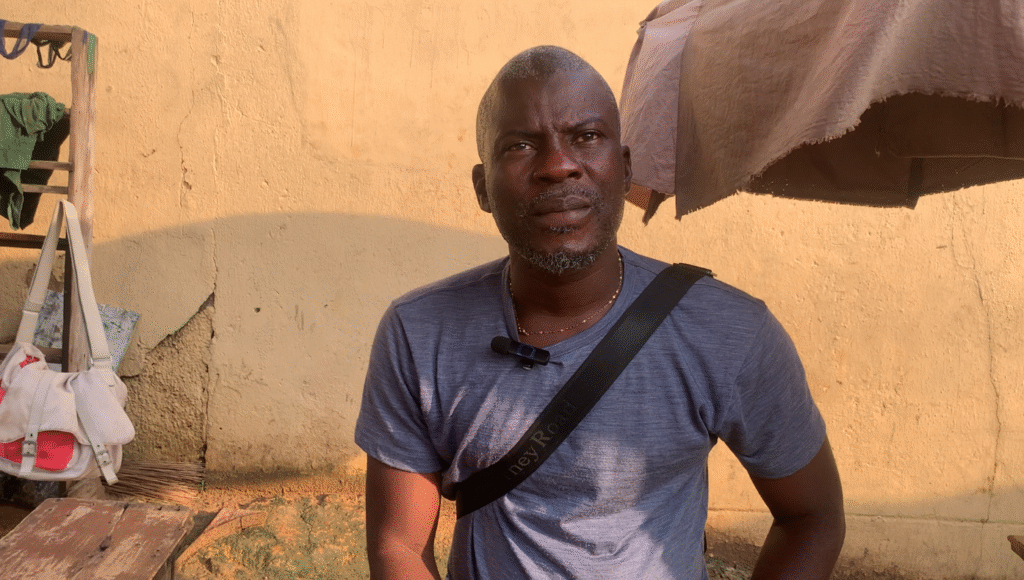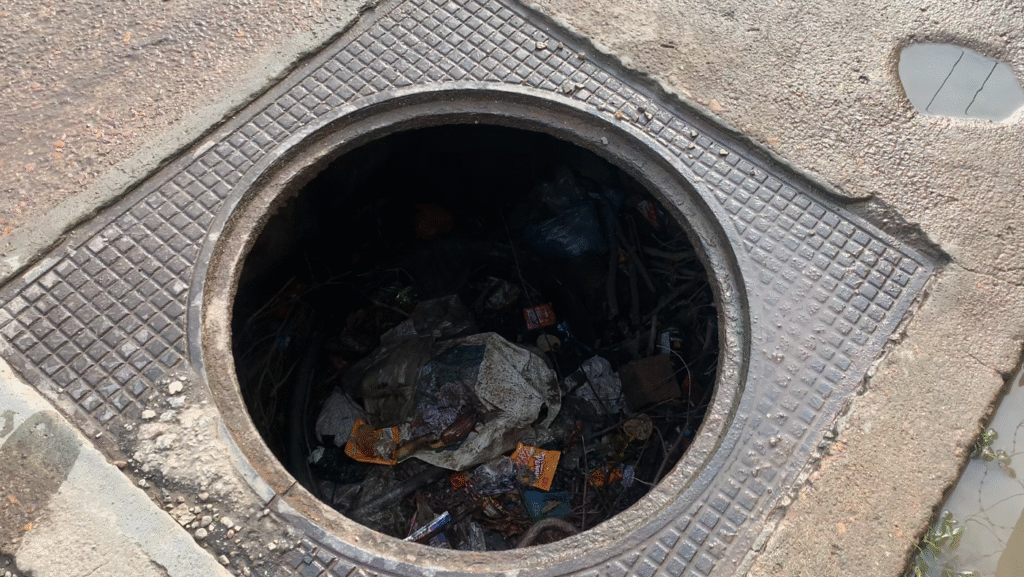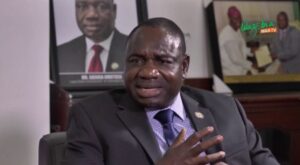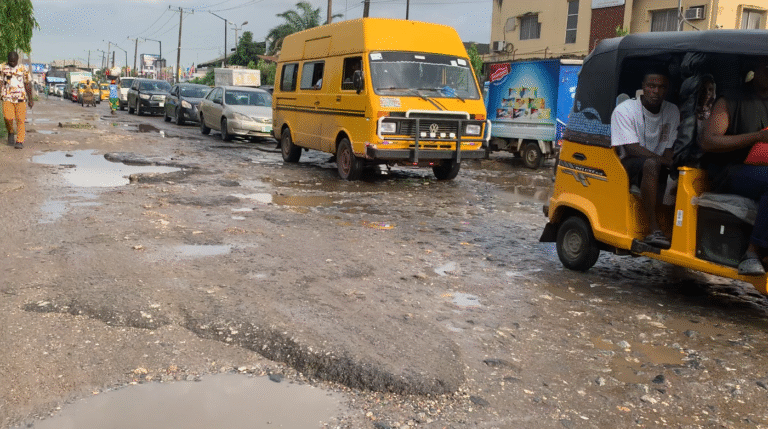By Sodiq Mojibola, Olabisi Sulaiman & Moryam Bakare
Despite being home to key industries on Lagos mainland and thousands of daily commuters, the road networks linking Akanni Doherty, Oba Akran and Akilo have deteriorated into deep potholes, open drainages, leading to constant traffic jams, and making mobility a daily ordeal for residents, commuters and business operators.
The condition of this industrial corridor, which connects major parts of the mainland, has raised fresh questions about years of government neglect. Residents say the deplorable state of the roads has made transportation increasingly herculean and unsafe.
Lagos State prides itself on housing over 50 per cent of Nigeria’s investment and commercial activities, yet the infrastructure that sustains this economy continues to deteriorate.
As residents wade daily through floods and potholes, the government insists that its hands are tied, pointing to limited resources, widespread infrastructural damage, and a tax base where only 14 per cent of residents contribute.
A bus driver at Akanni Doherty junction, Olawale Peter, said, “Since I was a child, this road has been like this. I think it’s more than 20 to 30 years.
“It’s really affecting us, especially around Akanni Doherty and Henry Carr. It’s quite ridiculous. It usually damages our tyres, and the government is not doing anything about it.
“About two-three years ago, they did a little touch, but everything went back to the way it was under two to three months.”
For Mr Peter, the difficulty of navigating the road has not yet translated into higher fares for passengers: “The economy is already hard on the citizens, so we still carry them for the same amount,” he said.
Yet, the unending mechanical damage done to vehicles that ply the roads tells different stories.
The deterioration is not isolated. A household survey found that 21 per cent of respondents identified poor drainage as a major road-related problem, while 26 per cent cited bad road surfaces.
Heavy downpours regularly shut major roads in one week, heavy rainfall submerged axis like Lagos-Abeokuta Motorway, Ikorodu Road, Oworonshoki and Agege, leaving motorists stranded and vehicles out of service.
Traffic congestion further compounds the economic cost. The Lagos State Government estimated that residents lose up to N1 trillion annually because commuters spend an average of six hours a day stuck in traffic. Another estimate used by state transportation advisers places the loss at N4 trillion annually when four hours are lost daily.
In 2024, the Lagos State Public Works Corporation (LSPWC) reported it intervened on 459 roads: 316 fully completed and 143 ongoing. It also desilted 433 kilometres of drain channels. Despite these efforts, residents in the affected areas say “palliative efforts” are washed away in months.
Residents count losses
A POS operator within the axis, Junaid Ibrahim, stated that the administration of former Lagos State Governor Akinwunmi Ambode once repaired the Akanni Doherty-Asade stretch, but it didn’t last up to two years before it got bad again.

“Since 2016, when I have been working here, apart from putting stones to fill it up, maybe twice a year, they are not ready to do anything. Even the stones spoil car tyres,” Mr Ibrahim said.
Similarly, a civil engineer, Gbenga Oguntola, who works in the area, painted a business and social impact picture, telling DevReporting that businesses as well as residents in the area suffer a great deal from merely walking across the bad road.
At Akilo, a shoemaker, Aliu Hassan, recounted how a recent downpour had flooded the road and damaged his business.
According to him, “With a 30-minute rainfall, everywhere gets flooded. One day, a trailer sped through the flood and splashed water; my show glass in the process fell and broke. Repairing it cost me almost N20,000.”
Specifically in Akilo, the road that passes the location of a firefighting service point could obstruct emergency response, especially whenever rain falls. In front of the firefighters’ point are portholes that constantly inhibit both human and vehicular movements.

Beyond potholes, metal scavengers steal manhole covers
DevReporting observed several open drain channels and missing manhole covers along the stretch.
Residents accused metal scavengers of removing the iron covers, leaving gaping holes that endanger motorists, motorcyclists and pedestrians.

“All the underground tunnels that lead to the canal have been opened by scavengers,” said Mr Ibrahim.
“We don’t even know if kidnappers are hiding there. If it rains, someone could fall in there. This is very dangerous, so the government should also repair them.”
When asked if government agencies were aware, he replied that government agencies at different levels have visited the roads in the past. However, he noted that none of the visitations has translated to a sustainable road repair.
“Yes, they know. Local and state officials have come. Even the new chairman and vice walked through here. But nothing has changed.”
A call for sustainable intervention
Despite the years of waiting, those who live and trade along the route remain hopeful. They emphasised that they need more than a stone-fill or temporary overlay; they want a lasting, sustainable solution.
As a civil engineer, Mr Oguntola stated, “The best thing is that the road should be repaired, and I will advise that they do it thoroughly, because usually after some palliative measures are applied to the road, it only takes one to three months before we start seeing potholes again.

“This is an industrial area where the government generates revenue. I am calling on the federal, state, and local governments to look into these roads because they’re affecting a lot of businesses and slowing down daily activities.”
ALSO READ: Nigerian govt shuts 41 schools over insecurity
In the same vein, Mr Ibrahim echoed the call, adding that other infrastructure, including streetlights, tunnels and drainages, have failed due to poor maintenance culture.
Government reacts
Reacting, the Lagos State Commissioner for Information, Gbenga Omotosho, acknowledged that some roads in the state are in bad condition, but said the state agencies in charge of road construction and maintenance are working “day and night” in other parts of the state that equally need prompt attention.

Speaking to DevReporting in a telephone interview, Mr Omotosho stated that road construction efforts require a gradual process, adding that the government cannot fix the 5,000 roads in the state simultaneously, especially during the rainy season.
According to him, “People are complaining about the Lekki-Epe Expressway. We had a stakeholders meeting there to show them that the contractors will start work almost immediately. We have about 5,000 roads; there’s no way that we won’t have some of them that are bad, and there is no way we can fix all of them at the same time,” he said.
The commissioner assured that while the state is making concerted efforts across the state on the issues of bad roads, there will be more construction actions on the affected roads as soon as the rain subsides.
He added that heavy-duty trucks are causing damage on the roads: “Here is a state that has industrial areas where roads fixed can become bad again because of all manner of overloaded trucks. Look at Ikorodu road, even though it is a federal road, you will see that it is an effect of overloaded trucks using the road.
“So, if people in Akilo and other places are complaining, I am not saying that they don’t have the right to complain. The government will repair the road, but it must be done gradually. There’s no way we can fix everything at the same time.
“The ones that are really bad and big, contractors are working on them. There is no part of Lagos State where we don’t have contractors working. Now that the rain is subsiding, there will be more action on the roads,” Mr Omotoso assured.
Only 14% Lagosians pay tax – Commissioner
The commissioner stated that the government has limited resources to carry out multiple projects at a time, revealing that only 14 per cent of about 30 million Lagosians pay tax.
According to Mr Omotosho, 6.2 million people are in Lagos taxpayers’ database, but only 4.2 million are active, while more than 80 per cent are salary earners.
“All those people who are complaining about roads don’t pay anything to the government. They don’t pay any tax,” he said, noting that there is a heavy burden on the state purse from which health, education, and other sectors are funded.
“People have the impression that the government has unlimited resources and all the roads in Lagos can be fixed in one week. Don’t forget it’s the same purse that everybody draws from to build schools, hospitals, pay doctors, pay salaries, and do every other thing,” the commissioner said
Mr Omotosho called for responsible citizenship that not only demands the guarantee of rights but also acknowledges and fulfills civic obligations and responsibilities, including the payment of taxes.
“We live in a society where everybody is talking about their rights and privileges, but nobody talks about their responsibilities. Those who are rich, well-to-do, and have vehicles are not paying a penny (tax),” he added.

